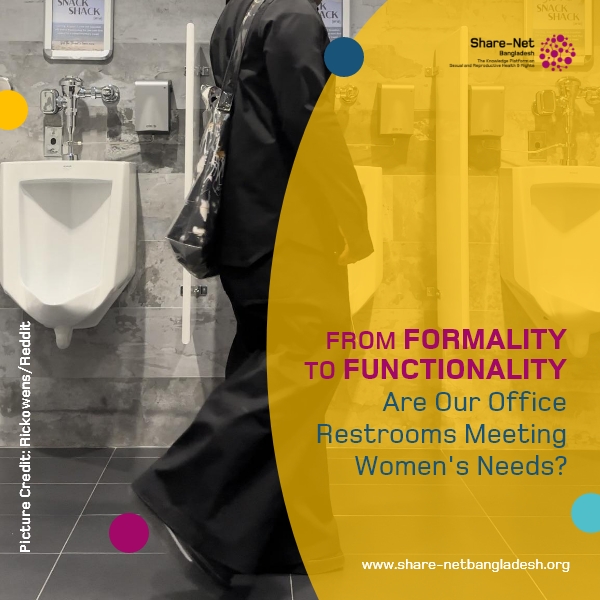From formality to Functionality: Are Our Office Restrooms Meeting Women’s Needs?
In 2024, as women constitute more than 42 percent of Bangladesh’s labor force, it’s utterly disheartening that dedicated washroom facilities for them are still not the norm, particularly in public places and government offices.
Shayla, a government employee based in Jashore, takes drastic measure of limiting water intake during her 9-to-5 shift to avoid using the restroom. This speaks volumes about the deplorable conditions she faced. Her revelation about the restroom being shockingly unusable sheds light on a pervasive issue affecting countless working women. The absence of private and hygienic spaces for women not only compromises their dignity but also impacts their overall well-being.
The situation becomes even more critical during menstruation, as Mithila, a government banker from Sherpur, courageously shares her struggles. The absence of a dedicated female restroom forces her to use shared facilities with male coworkers, creating awkward situations. The lack of a covered rubbish bin exacerbates the difficulty of discreetly disposing of sanitary products, highlighting the urgent need for gender-specific amenities in workplaces.
Separate toilet facilities are not just a matter of convenience; they are a fundamental right. The United Nations General Assembly has officially recognized water and sanitation as essential human rights. Companies that provide staff with separate restrooms align with Sustainable Development Goal 5 (Gender Equality) by contributing to the abolition of discrimination against women and girls worldwide. Additionally, providing separate facilities supports SDG 6: Clean Water and Sanitation, aiming to ensure access to adequate and equitable sanitation and hygiene by 2030.
The rise in female labor force participation, reaching 42.68 percent in 2022, demands a reevaluation of workplace facilities. The Labour Force Survey 2022 underscores the significance of addressing the needs of women in both rural and urban settings. To achieve inclusivity and comfort for all workers, particularly women, it is imperative for the government to initiate measures that comply with labor laws and workplace facility regulations.
Shayla and Mithila’s stories underscore the broader implications of the restroom crisis. It’s not just about the lack of facilities; it’s about the impact on women’s sexual and reproductive health rights (SRHR) and workplace hygiene. The absence of proper restrooms can compel women to compromise their wages and work hours during menstruation, perpetuating harmful stereotypes of unreliability or irresponsibility.
Recognizing and addressing the specific needs of female employees is not just a matter of compliance; it’s a statement about an organization’s commitment to inclusion and diversity. The provision of amenities such as sanitary napkin disposal bins ensures that female employees can navigate their workdays with comfort and dignity.
As the government focuses on overcoming challenges in the evolving workforce landscape, addressing the overlooked issue of female-friendly restrooms becomes a praiseworthy initiative. By taking steps to ensure gender-specific provisions in workplace facilities, the government can champion gender equity, contributing to a workplace culture that respects the dignity and rights of every employee.
In the quest for a more inclusive and equitable workspace, it’s time to break the silence surrounding the state of female-friendly office restrooms and pave the way for positive change. The government’s commitment to addressing this critical issue will not only enhance the well-being of female employees but also contribute to the broader goals of sustainable development.
Source: The Daily Star
Source Contributor: Monira Sharmin, columnist and research student, PGD programme in Disaster Management, BRAC University
Picture Credit: Gabor Monori/Unsplash


